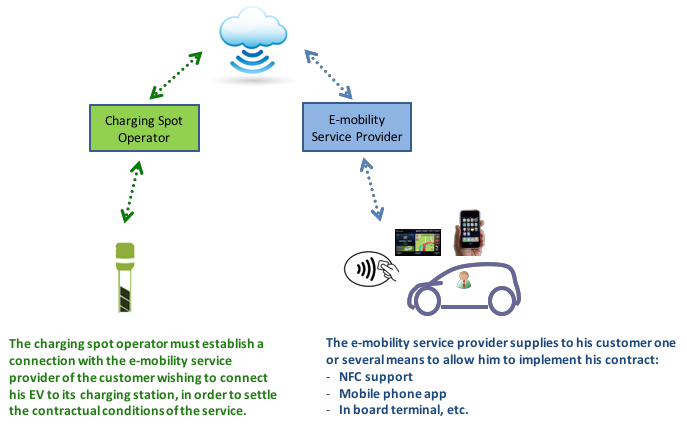
The following priority topics are developed within AFIREV:
- Attribution of registration numbers of essential connected objects for roaming of charging service;
- Organisation of charging service payment,especially by local authorities;
- Study of future contract identification medias;
- International relationship.
-
Referring to the overall scheme of links required for roaming of charging services shown below,
It appears necessary to identify in a unique and universal way the following 3 objects:

- Each contract between a customer and his e-mobility service provider,
- Each charging spot,
- Each charging station pool.
These 3 objects are defined as follow :
- A contract for e-mobility service covers the nature, the quality and the prices of services provided by an e-mobility service provider to his customer, including in particular the conditions of access to charging points of different charging spot operators.
- A charging point is an interface within a charging station capable of recharging a single electric vehicle at a time, associated with a parking space.
- A charging station pool comprises one or several charging stations, supplied by a single delivery point on the public electricity distribution grid or by a single local energy production or storage facility, and operated by a single operator.
-
Further to the DIRECTIVE 2014/94 / EU OF THE EUROPEAN PARLIAMENT AND OF THE COUNCIL of 22 October 2014 on the deployment of an infrastructure for alternative fuels, and its translation into French texts, three possibilities for payment of the charging service must be possible:
- Payment under a contract held by the user with the charging spot operator of the charging spot that he wants to use,
- Payment under a contract held by the user with another operator, as an e-mobility service provider,
- Direct payment to the charging spot operator for a user not willing to subscribe any contract.
Considering local authorities being investor and owner of charging infrastructure, generally sub-contracting its operation, a difficulty has been raised for cases 2 and especially case 3, with respect to general rules enacted by Ministry of Finance concerning the management of the revenues from public services.
The Ministry has adapted its rules to solve this difficulty. In a partnership with AVERE France association, AFIREV has worked out a template of mandate for management of revenues from EV charging services by a subcontractor of a local authority.
Through such a mandate, the local authority can open access to her charging infrastructure to users paying in any of the three cases listed above.
-
The contract identification media currently used in almost all cases by e-mobility service providers is the “Myfare” type badge. It includes an identifier engraved by the manufacturer of the badge which can be read by any RFID reader compatible with « Myfare ».
The e-mobility service provider records in his customer management system the correspondence between this identifier and the parameters of the customer to which he has given the badge.
The charging spot operator who reads the identifier carried by the badge via the reader on the charging station must then get the correspondence between this identifier and the e-mobility service provider who issued it in order to settle the conditions of charging service roaming.
This solution has several disadvantages in terms of openness to the multiplicity of operators and security of transactions, that will increase with the number and diversity of contracts and operators.
Moreover, other solutions for contract identification will emerge, based on other NFC devices, especially those for public transport (and other public services), applications on smartphone (with NFC or not) or other forms of communication between the user, or his vehicle, and the charging station.
AFIREV therefore considered necessary to esstart the exhaustive study of the possible future contract identification medias in order to ensure their integration in the organization of charging service roaming in safe and economic conditions.
This study is under course and its conclusions will be published in the course of 2017.
-
EV charging service roaming must have no geographical boundary and therefore be deployed in France in a manner compatible with other countries.
Therefore, AFIREV maintain international relations in order to contribute to the elaboration of international standards in relation to charging service roaming, and to ensure that the solutions adopted in France are compatible with them.
The bodies of interest from this point of view are:
- Standardisation bodies ISO and IEC, with special concern for ISO-15118 standard, under development, which defines the modalities of communication between an EV and a charging spot.
- The European association « eMI3 » which works out reference texts in order to accelerate the deployment of charging service roaming, pending their transformation into standards by the specialized bodies. AFIREV is “full member” of eMI3 and actively participates in its works.
- Working group « STF-SGEMS » settled by EC – DG MOVE in 2015 to draw up additional recommendations for the implementation of DIRECTIVE 2014/94 / EU OF THE EUROPEAN PARLIAMENT AND OF THE COUNCIL on the deployment of an infrastructure for alternative fuels infrastructure. This working group deals specifically with the development of e-mobility services and is expected to issue its recommendations by the end of 2016.
- Agencies from other countries that allocate identifiers to operators under the same conditions as AFIREV in France. To date, three countries have set up such an organization: Austria with Austrian Mobile Power, Germany with BDEW, and The Nederland with association e-Violin. AFIREV and these agencies form an alliance with common agreements to share rules and publication of identifiers.
Read more about:
ISO 15118 standard
Association eMI3
